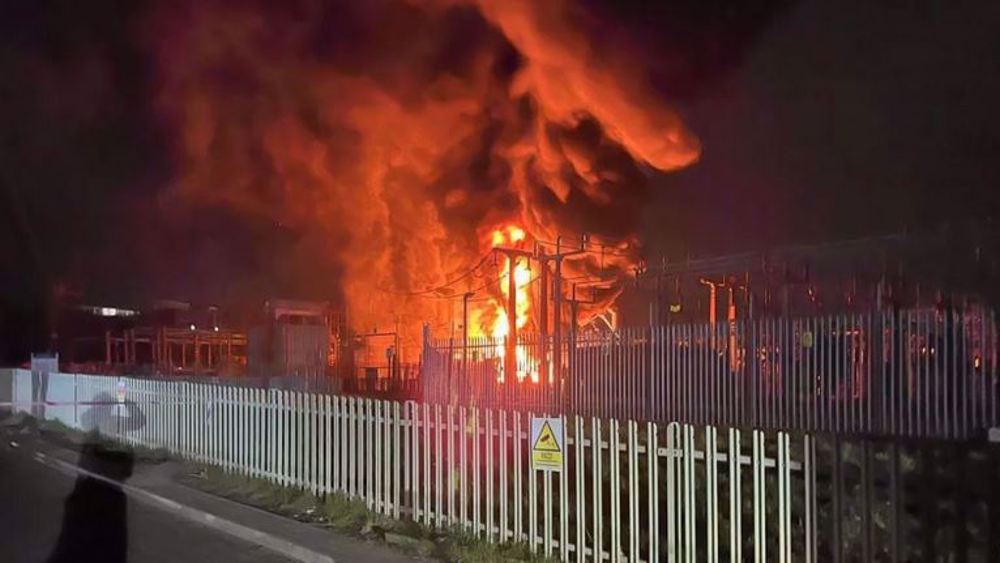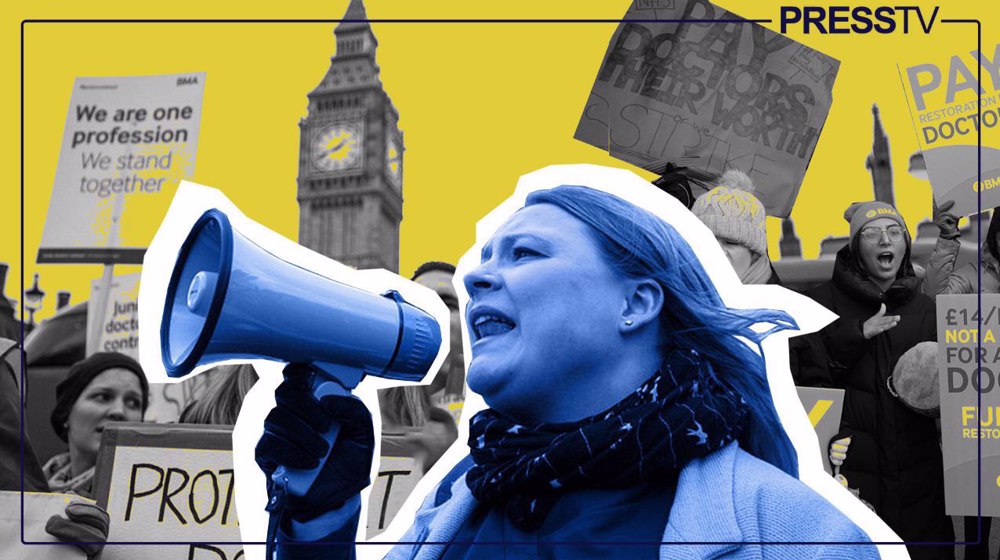UK doctors strike, patients suffer, govt. looks other way
By Reza Javadi
Thousands of junior doctors in the United Kingdom launched their third round of strikes this week, after labor forces in other industries walked out of their jobs, signaling the government’s inability to put an end to the long-running dispute over payments amid skyrocketing inflation.
The three-day walkout by medics again caused massive disruption and cancellation of thousands of appointments and operations across the National Health Service (NHS), the country's public healthcare system that has been hit hard by months-long industrial action in the UK.
One of the key reasons for the long-running dispute across the NHS is that the British government has offered a pay increase that is half the inflation rate, while workers demand more than a 25 percent rise.
For instance, the British Medical Association (BMA) is calling for “full restoration” of pay, which has seen a 26 percent cut, while the government has offered only a 5 percent rise to end the dispute.
Dr. Vivek Trivedi and Dr. Robert Laurenson, co-chairpersons of the BMA junior doctors committee, blasted the government’s inaction toward the dispute and in a statement said junior doctors "are in despair over the government’s refusal to listen.”
NHS and its struggle for survival
“It should never have taken two whole rounds of strike action to even put a number on the table, and for that number to be a 5 percent pay offer – in a year of double-digit inflation, itself another pay cut – beggars belief,” Trivedi and Laurenson stated.
"Junior doctors in England have seen their pay cut in real terms by more than a quarter over the last 15 years." "Today they are demonstrating what that means to the survival of the NHS."
Disillusioned with the Health Secretary, the junior medics in a letter on June 14 asked British Prime Minister Rishi Sunak to address the issue.
"79% of Juniors in England have no confidence that the Health Secretary can deliver a resolution to the ongoing dispute. We have therefore written to @RishiSunak to ask him to intervene and meet with us urgently to find a way through this," read the letter.
The deplorable conditions in the British health delivery system have prompted many workers to plan a leave from the system.
According to a recent BMA poll, 53 percent are planning to leave the NHS due to the government’s inability to address the issue in more than a year.
The polling, which involved 1,935 junior doctors in England, also revealed that around 67 percent do not think the NHS in its current form will exist in 10 years and 88 percent expect the NHS to get worse over the next 18 months.
Rory Deighton, director of the acute network at the NHS Confederation, was at pains to talk about the disruptive and risky impact of these strikes across the system.
“Each wave of strikes chips away at the NHS’s resilience, impacting on staff, internal relationships, and their ability to deliver on government pledges to reduce the elective backlog,” he said.
Series of industrial actions
The latest strike by junior medics comes on the heels of industrial action by several other workers across NHS, such as nurses, ambulance staff, and paramedics.
Apart from NHS, other industries such as railways, airports, passport service centers, London Underground, Royal Mail, schools, universities, and several other industries have also been affected by repetitive strikes, as the labor force demands their rights in the face of a worsening cost-of-living crisis across the UK.
Train drivers are as furious as NHS staff, planning to continue their industrial action for the next six months.
Mick Whelan, general secretary of the British trade union ASLEF, was quoted as saying they won’t stand back from their rights and are “in it for the long haul” and will continue to ballot every six months on whether to continue their stand against the government’s pay offers.
“Train drivers are sick to the back teeth of their employers and the Government failing to negotiate in good faith, and blaming drivers for their inability to manage services and the rail industry effectively,” he said.
Meanwhile, teachers are also set to continue their strikes, with the National Education Union (NEU) telling its members to reject the average 4.5 percent pay rise offer by the Department of Education.
Cost of living crisis
The cost-of-living crisis – which has triggered all these strikes – has caused food costs to go through the roof with poorer families eating fewer meals a day.
In a survey last month, the Resolution Foundation, a leading think tank in the UK, said food prices would continue to increase even further, as a result of the worsening cost-of-living crisis.
Lalitha Try, an economist at the Resolution Foundation, warned that UK authorities did not have a proper image of what the impact of rising food prices would be, saying the cost-of-living crisis "isn’t ending", but "just entering a new phase.”
“Britain is only at the mid-point of a two-year income squeeze, which is set to leave typical families £2,100 worse off. The crisis is already taking its toll on families, with over six million adults reporting they are going hungry as a result,” she said.
Try hastened to add that low-income families "have been hit hardest by soaring energy bills and food prices, and are most likely to have seen both their financial circumstances and their health deteriorate.”
Chief executive of the Resolution Foundation Torsten Bell warned that rising food prices would force low-income households to eat less.
Soaring food prices
“When the price of some food products rises, consumers switch to others. But that strategy isn’t available in the same way to those on lower incomes,” Bell said.
“What happens instead? Poorer households have to cut rather than adjust their consumption – which is another way of saying they eat less."
It comes as the same think tank in an earlier study found that a fifth of people were already eating less or skipping meals, with the proportion even higher and worse among low-income households, black families, and those in large households.
According to governmental figures, food prices have also increased sharply over the past year and were 19 percent higher in April 2023 compared with a year before, just below the 45-year high of 19.1 percent set in March 2023.
Meanwhile, several factors such as increases in energy prices, food prices, and the costs of consumer goods have been important in driving inflation in the country.
The following diagram shows the proportion of each of the factors, driving the UK inflation above 10 percent.
Even in April, when the inflation dropped by more than 1 percent, the UK inflation still stood at a higher rate than similar economies around the world.
The British economy is at a most unhealthy stage, with most of the data reporting a drop in financial indicators and a dark economic outlook across the country.
The government insists that the assessments presented are not consistent with facts, but experts say widespread dissatisfaction among ordinary people, largescale demonstrations and long-running public sector strikes point to the depth of the country's economic problems.
However, British officials have already realized the extent of the disaster, clearly announcing to Britons that the economic challenges will not disappear this year while withdrawing from their promises of halving inflation by the end of the year.
Reza Javadi is a Ph.D. candidate in British Studies at the University of Tehran.

Rights groups urge UK prime minister to hold back on anti-migrant rhetoric

Report: Most Britons ignorant about scale of UK slavery

London’s Heathrow announces shutdown due to ‘significant power outage’
Remembering Abdel Aziz Al-Rantisi, Hamas co-founder and ‘Lion of Palestine’
Pezeshkian: Iran, Saudi Arabia can serve as model for cooperation
German police arrest pro-Palestine students at Humboldt University
VIDEO | Education under siege: UN warns of school closures in occupied al-Quds
VIDEO | Israeli drones burn children inside 'safe zone'
VIDEO | Gaza Christians mourn amid Israeli genocide
Russia: Europe trying to ‘derail’ talks with US, continue war
Saudi Arabia, Iran stress willingness to expand military ties









 This makes it easy to access the Press TV website
This makes it easy to access the Press TV website